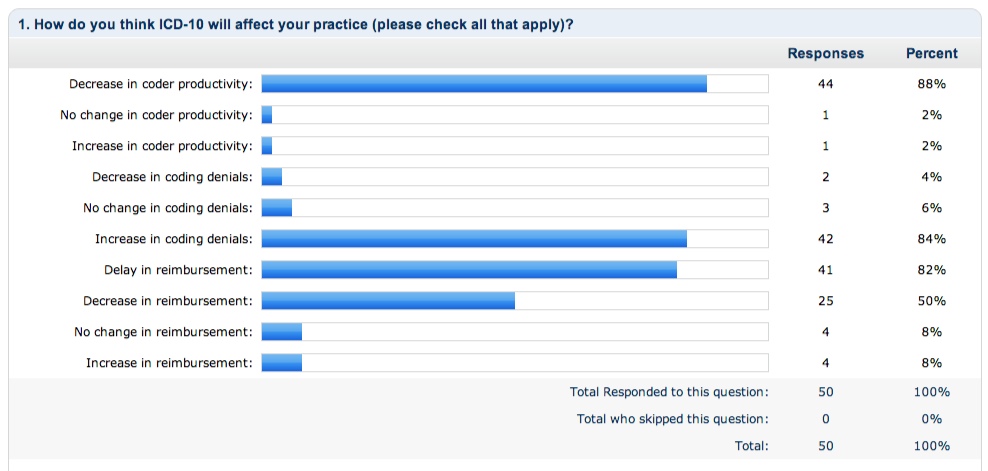Working with our partner, Universal Health Network, we’ve learned a lot about medical billing and all of the changes that are coming up. Terms like ICD-10 and meaningful use have been floating around since this time last year, but like many others out there, we didn’t have the specifics.
First, it is important to know what the difference is between ICD-10 and its predecessor; ICD-9. Coders will have to go from knowing 13,000 diagnosis codes to a whopping 68,000 codes with ICD-10. If you’ve been wondering what people have been complaining about, this is it. Imagine the knowledge needed for you skill set growing to more than six times its size and trying to keep up. Inconveniently, there are no simple conversions from ICD-9 to ICD-10. Some codes here and there are remaining the same, unfortunately the new system is much more robust. Taking one code and breaking it down into many more specific codes now, the ICD-10 codes even look different. Previously, codes were only 3-5 characters, while now they can have up to 7 characters.
Now, why was it necessary to make all of these changes if the system worked before? Well, think about how fast technology has changed over the last few years. There’s literally a new iPhone every other year and people all across the world immediately adopt that new technology. Now think about the medical advancements that are being made daily. Every year there are newly identified medical conditions and brand new treatments and medical devices discovered. Just to give you an idea of how desperately these changes were needed, ICD-9 had been around since 1979.
(Medical Advancements from 1979 to 2003 via: AAMC)
1979 First use of the immunosuppressant drug cyclosporine, now standard therapy for organ-transplant patients
1980s Development of coronary angioplasty
1980 First acute spinal cord injury intensive care unit
1981 First successful surgery on a fetus in utero
1981 Establishment of the first Pediatric Trauma Center
1981 First successful human combined heart/lung transplant
1981 Development of the first artificial skin made from living human cells
1981 Descriptions and reports of the nation’s first cases of AIDS
1981 Development of balloon angioplasty
1983 First performance of autologous bone marrow transplant for acute myeloid leukemia
1984 First successful pediatric heart transplant
1985 First Fetal Cardiovascular Center
1986 First hospital to initiate a lung transplantation program
1986 First use of lithotripsy to break up common duct gallstones
1988 First successful double-lung transplant
1989 First living-donor liver transplant, and in 1993, the first liver transplant from an unrelated living donor
1989 Identification of human umbilical cord blood as a suitable source for stem cell transplantation
1993 First Geriatric Research and Training Center
1993 First human gene therapy trial for cystic fibrosis
1993 First gene-therapy procedure on a newborn infant, correcting an inherited disorder of the immune system
1994 First use of functional MRI to provide rapid diagnosis of most strokes
1994 First gamete intrafallopian transfer for treatment of female infertility
1994 First human retinal cell transplant
1995 First implantable, artificial inner ear for treatment of deafness
1995 First deep brain stimulator implantation for the treatment of Parkinson’s disease
1996 Development of computer-assisted stereotactic neurosurgery
1997 First use of gene therapy in cardiac disease in humans
1997 First stem cell transplant for active lupus
1997 First retinal transplant
1997 First transplant of human fetal tissue in patient with spinal cord injury
1998 First laryngeal transplant
1999 First hand transplant
2000 First quadruple transplant of four organs—a kidney, two lungs and a heart—from a single donor
2000 First bioengineered cornea transplant
2001 First implantable replacement heart that functions without a permanent attachment to a power source
2001 Discovery of stem cells within the pancreas that can generate insulin-secreting beta cells
2002 Development of a Rapamycin-coated stent, a breakthrough in the prevention of restenosis following cardiac catheterization
2003 First successful larynx reconstruction accomplished using tissue taken from patient’s arm
The time to make changes will be up on October 1st this year and those who have not taken steps to prepare for ICD-10-PCS will be left in the dust. This transition period is predicted to be rather turbulent for providers across the board, even 1/3 of hospitals still haven’t started their ICD-10 education. Those who haven’t been getting ready have a couple of options at this point:
- begin training with ready-made education programs
- out-source your coding to a medical billing company
Having your coding managers in-house certainly has its pros, but with these changes, getting by with your current systems will prove very difficult. When it comes to coding, the margin for error has grown and with reimbursement cuts, it is increasingly more important to be accurate.







